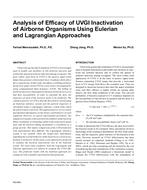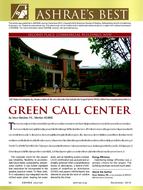The objective of this study was to assess a new methodology in operating a building HVAC system by dynamically integrating ventilationand air cleaning for reduction of building energy consumption while improving occupant health and comfort in office environments. To demonstratethe proposed methodology, a low energy office building was used as a testbed, which was subject to the variation of outdoor pollution due to nearbytraffic. A detailed building model was constructed by utilizing DesignBuilder and ContamW based on the building design and actual constructiondocuments for the analyses of combined indoor air quality (IAQ)/energy benefits. Target contaminants included formaldehyde, other 16representative VOCs and CO2 for the IAQ analysis. Dynamic profiles of outdoor pollution were based on actual monitoring data and the EPA2008 AirData. By setting up a suite of usage scenarios under four representative climate and outdoor air quality conditions throughout the U.S.including Syracuse, Los Angeles (mild), Houston (cooling dominant) and Duluth (heating dominant), the approach of dynamic integrationbetween ventilation and air cleaning was assessed. Results show that the minimum ventilation requirements in ASHRAE 62.1 may not besufficient for meeting the exposure limit constraints for IAQ (especially for formaldehyde). The integration strategy between dynamic ventilationand air cleaning technology would provide satisfactory IAQ for the compounds considered, and also can bring most energy/cost benefits (up to11% annual savings) for the case building.
Citation: IAQ Conference: IAQ 2013: Environmental Health in Low Energy Buildings
Product Details
- Published:
- 2013
- Number of Pages:
- 6
- File Size:
- 1 file , 1.2 MB
- Product Code(s):
- D-2013IAQConf-15


